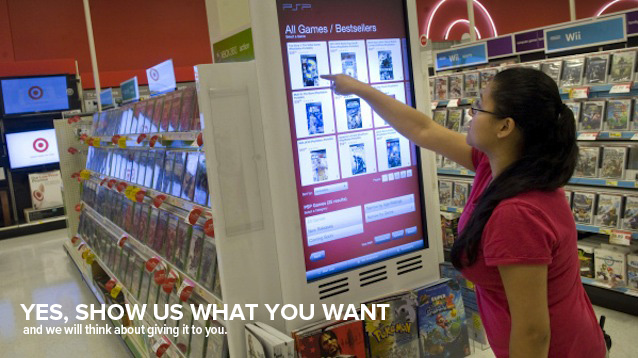
Let's start by getting this out of the way: I'm a nerd. This post includes some info that exposes me as a nerd. There. That's done.
I'm going to tell you a short story about how I bought the original "Halo" for the 3rd time (I have a problem), and how it perfectly illustrates a conflict between business goals and user needs.
On Acquiring Baking Soda
This past weekend, I ran to a nearby Target to pick up baking soda. Not a long ways off, but it's a trip and on the weekends, I'm pretty lazy. When I got there and found the stuff in question (I'll be honest, I have no idea what baking soda actually is), I remembered a conversation I had earlier that weekend about the 10th Anniversary edition of Halo, one of my top 5 games of all time. I thought to myself, "Since I'm here, I may as well pick that up." Yes, this is how my head works.
I went to the electronics section, which, to Target's credit, is reasonably well laid out, and found the Xbox games area. Ta da! "Halo: Anniversary Edition," and only $40! If you're not a huge nerd like me, $60 is really the norm these days. Not bad.
Now: pause. Go read this article about how Target is trying to work with other retailers to find a way to combat "showrooming," the idea that Target is just where you find and decide on the thing you want — which you buy on Amazon.
Okay, unpause: I went to go pick up the box when I noticed ... whoops, I can't. The game was attached to the shelf with a security device. In fact, all of the software was. There was a tiny little sign above them that said "If you'd like to buy one of these items, ask a Target associate for assistance."
Target: "Please, Buy This on Amazon"

I'm sure Target associates are great, but I immediately went "nope, not dealing with that" and walked across the store to the registers, checked out, and left. Oh, and on my way to the register, I pulled out my phone and found the same product on Amazon, saw it was $10 cheaper, bought it, and had it shipped to me for Thursday of this week. All in the time it took me to get in line.
Let's think about this. Target is concerned about being a "showroom" for these types of products (though especially for bigger ticket items like TVs) and yet they are content to be exactly that — a showroom. Make no mistake, if I could have picked up a copy of the game in question I would have paid them for it without a second thought. I'd be playing it right now. That appeals to me! I like having things sooner, rather than later.
Business Goals (Make Money) vs. User Needs (Buy Fun Things)
I understand their problem: theft is a loss of money, and Target can't combat loss by leaning on the kinds of high margins like the Apple Store. But this is just a poor customer experience and perfectly illustrates the frequent disconnect between business goals and user needs. The one thing Target can offer me over Amazon is immediacy: Target is 5 minutes away, and Amazon shipping (even if I pay through the nose) is next day, best case.
It becomes clear the fear Target must have. While we may be a long ways off from the day when we prefer to buy things like toothpaste and baking soda online, the day when we prefer to buy things like software, electronics, clothes, or any of a thousand other things, is already here.
What could Target offer me, as a consumer of electronic goods, that the Internet cannot? Immediacy, and personality. I couldn't easily buy what I was looking for, and there was no one nearby waiting to help a frustrated-looking customer. For comparison, go to an Apple Store: if you glance at a Macbook Pro, a specialist will appear to see what you might want to know and how they might help you. And if you want to buy a new iPhone case you can use a free app from Apple to buy it, right off the shelf, without even needing to talk to a store employee. It's amazing.
Technology is so rapidly changing how we interact with our world, and how it's changing our social norms. If I didn't have a smartphone, what I did would've been impossible, and I might have buckled and tracked down a Target employee.
Think about your service, or product. Are you considering your user's goals, and your business needs, in light of the way technology is changing people's perception and behavior? What are you not offering, or not considering, that might cripple you in the coming months and years? Target has at least realized this is a problem, but the follow through is a bit ... lackluster. Now if you'll excuse me, I've got Covenant to kill.